A record-breaking 12 candidates graced the Democratic presidential primary debate stage in Westerville, Ohio — and many of them took aim at Massachusetts Sen. Elizabeth Warren, particularly her position on Medicare for All, as she’s continued to rise in national and state-wide polls.
Buttigieg used the debate over Medicare for All to spar with Warren. While Warren supports Sanders’ Medicare for All plan, Buttigieg supports Medicare for All Who Want It — which would allow Americans to keep existing private insurance plans. Buttigieg pounced on Warren for evading a yes-or-no question about whether taxes would go up on middle-class families due to her plan: “You heard it tonight: a yes or no question that didn’t get a yes or no answer,” Buttigieg said.
Breaking with this year’s tradition of starting debate by arguing over the nuances of the candidates’ health-care plans, the moderators began by asking the 12 contenders about the impeachment inquiry into President Donald Trump — which followed a whistleblower complaint alleging the President used his office to “solicit interference from a foreign country in the 2020 U.S. election.”
In line with recent public opinion polls that show the majority of Americans support the Democratic-led impeachment inquiry, every candidate that had an opportunity to answer expressed similar views on the subject. Trump is “the most corrupt” president ever, said Vermont Sen. Bernie Sanders. “The President has left the Congress with no choice,” said South Bend, Ind. Mayor Pete Buttigieg. “I want to remind everybody that every candidate here is more decent, more coherent and more patriotic than the criminal in the White House,” said businessman Tom Steyer, who graced the debate stage for the first time Tuesday.
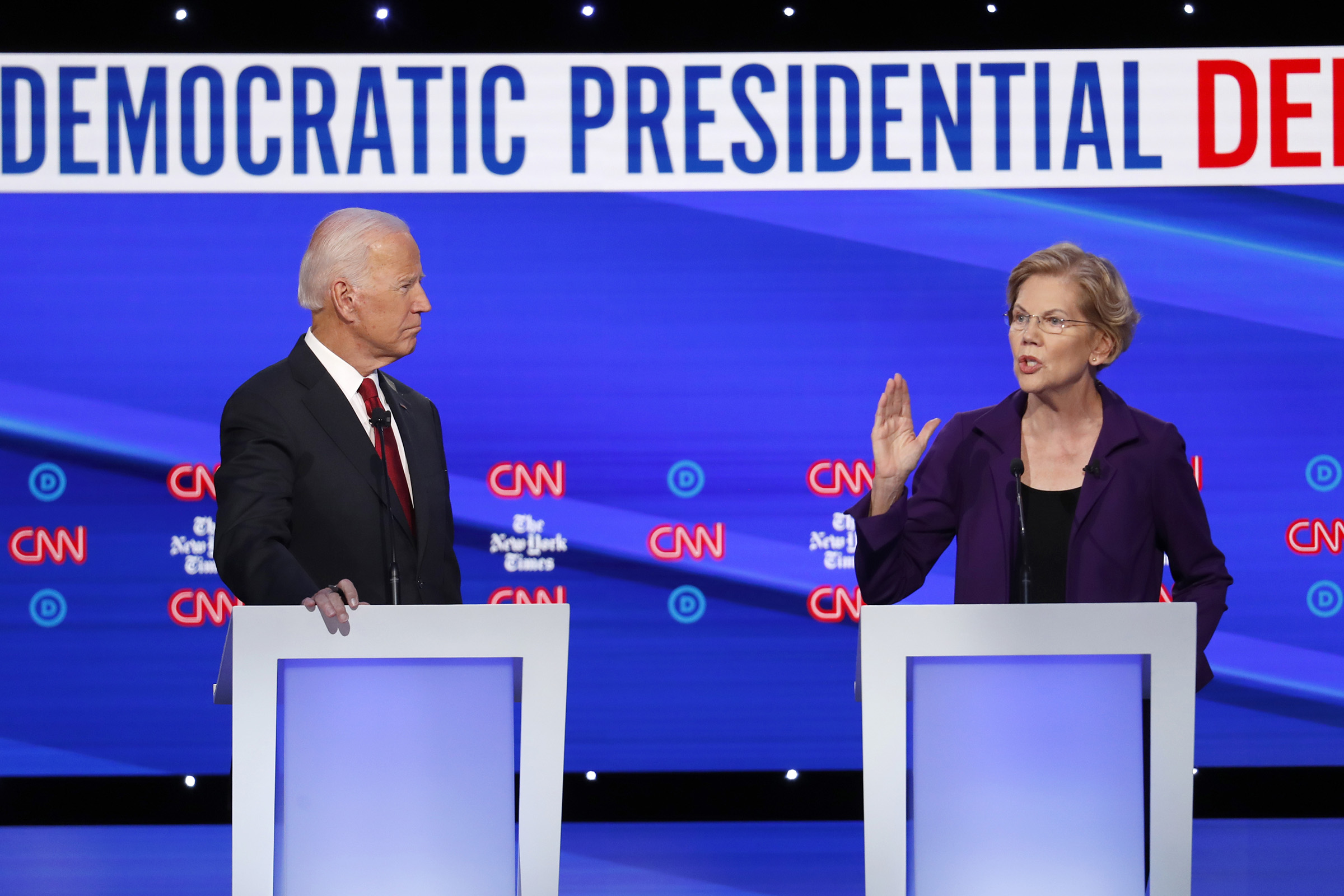
In the early moments of the debate, candidates also debated federal job guarantees. “Damn right, we will,” Sanders said to a question about whether he would be able to ensure every American who wanted a job could have one. Yang criticized Sanders’ plan, arguing that it would not take into account people like his wife, a stay-at-home mother.
Unlike September’s debate, some candidates also brought up reproductive rights, in light of new legislation in several states aiming to limit or restrict access to abortion. “There are states that have passed laws that will virtually prevent women from having access to reproductive health care,” Sen. Kamala Harris said. “And it is not an exaggeration to say women will die. Poor women, women of color will die because these Republican legislatures in these various states who are out of touch with America are telling women what to do with their bodies.”
Sen. Cory Booker praised Harris’ comment: “God bless Kamala. But you know what? Women should not be the only ones taking up this cause and this fight,” Booker said. “It is not just because women are our voters and our friends and our wives. It’s because women are people and people deserve to control their own body.”
All 10 candidates who appeared in the September debate were onstage with two additions: Hawaii Rep. Tulsi Gabbard and billionaire executive Tom Steyer, who made his Democratic National Committee-sanctioned presidential primary debate debut.
The debate was co-hosted by CNN and The New York Times and aired live at 8 p.m. from Otterbein University. CNN anchors Anderson Cooper and Erin Burnett and New York Times National Editor Marc Lacey moderated.
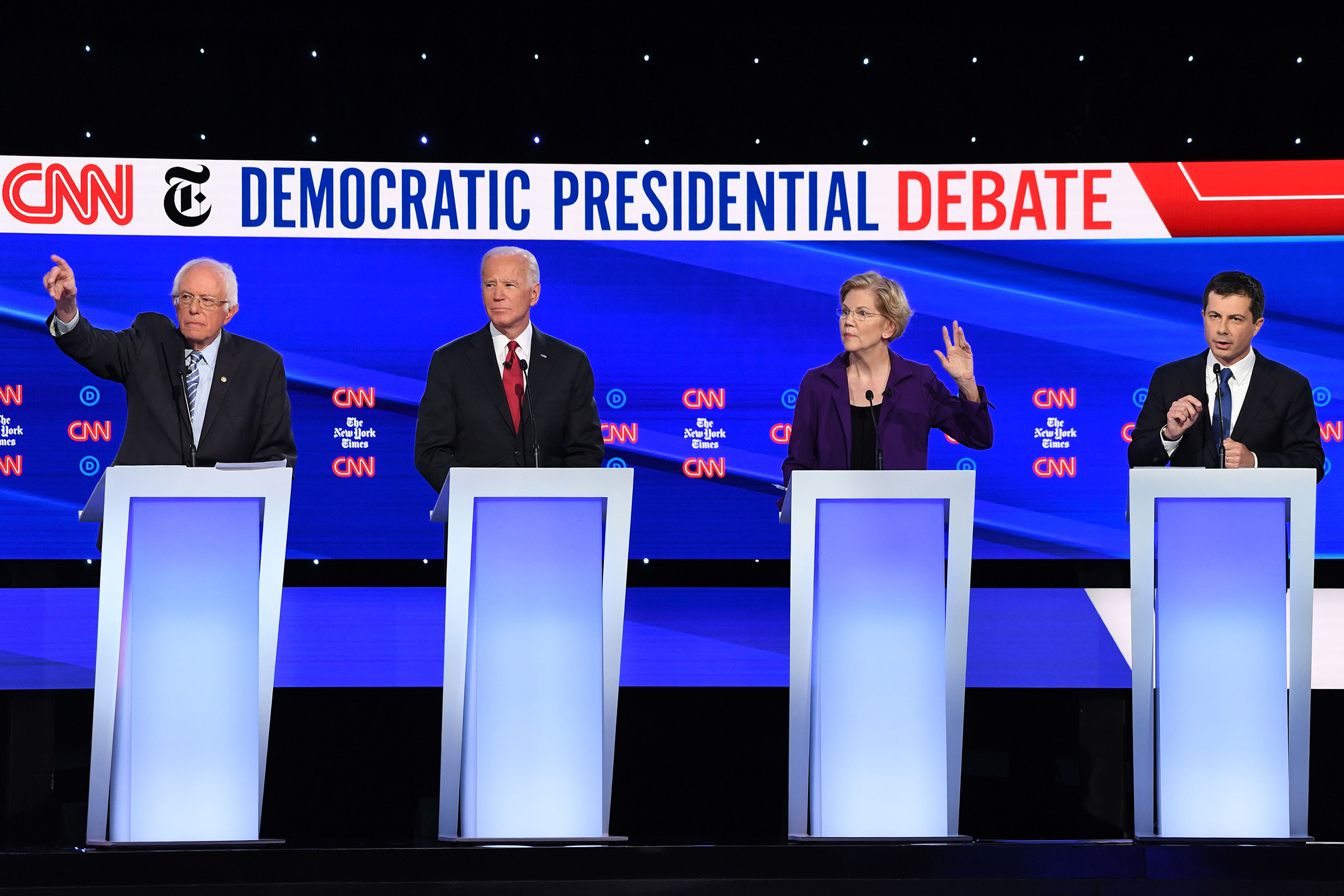
The debate also marked a milestone for women in politics. Four women were on stage, the highest number to ever share a presidential primary debate stage. The record was previously held by the past three 2020 Democratic presidential primary debates, which included three women on stage each night. Before the 2020 cycle, no presidential debate stage had included more than one woman.
Candidates needed to have at least 2% in four DNC-approved polls and receive at least 130,000 unique donations by Oct. 1 to qualify for the debate. The candidates are standing on stage based on the average of the 10 most recent qualifying polls as of Oct. 2. This puts Biden, Warren, Sanders and Buttigieg closest to the middle.
Here are highlights from the October Democratic primary debate:
Warren plays defense on Medicare for All
When the debate turned to health care, the knives came out for Elizabeth Warren. The moderators began by asking Warren how she would pay for Medicare for All and whether she would raise taxes as part of it. As she has in previous debates, the Massachusetts Senator focused on the results of her plan rather than getting into specifics.
“I will not sign a bill into law that will not lower costs for middle-class families,” she said.
But Pete Buttigieg and Minnesota Sen. Amy Klobuchar pushed back, accusing Warren of being evasive. Buttigieg said viewers were seeing “a yes or no question that didn’t get a yes or no answer” and touted his own “Medicare for All who want it” plan that would offer a public option that people could choose to buy into.
Klobuchar, meanwhile, called Warren’s plan a “pipe dream” and said that by talking about Medicare for All, she was creating “Republican talking points.” Bernie Sanders jumped in to back up Warren on the details of Medicare for All and highlight the issues with the country’s current health-care system. Warren defended herself too, calling Buttigieg’s plan “Medicare for all who can afford it” and stuck by her argument that overall costs would go down for middle-class families.
Biden addresses son Hunter’s Ukraine business interests
Moderator Anderson Cooper brought up President Trump’s unsubstantiated accusations that Biden’s son Hunter broke laws while serving on a company board in Ukraine. Although there’s no evidence of wrongdoing by Biden or his son, Cooper pointed out that Biden has since said that if he becomes President, none of his family members would be involved in foreign businesses.
Cooper asked Biden that if he says it would be inappropriate for his family members to be involved in foreign businesses if he’s President, why was it okay for his son to be involved in foreign businesses while he was Vice President?
“My son did nothing wrong. I did nothing wrong. I carried out the policy of the U.S. government, rooting out corruption in Ukraine,” Biden responded. Biden then evoked President George Washington, who is believed to have said a major threat to American democracy would be foreign interference. Biden said that Trump has encouraged foreign interference three times.
“Rudy Giuliani, the President, and his thugs have already proved that they in fact are flat lying,” Biden said. “He’s going after me because he knows if I get the nomination I will beat him like a drum.”
Cooper then followed up, citing a recent ABC News interview in which Hunter Biden said he made a mistake by becoming involved with foreign business dealings while his father was Vice President. Cooper asked the former Vice President if felt he had also made a mistake. “I did my job, I never discussed a single thing with my son about anything having to do with Ukraine,” he said. “We’ve always kept everything separate.“
Candidates express support for impeachment in debate’s first question
Impeachment took center stage as soon as the debate kicked off, marking a turn away from prior Democratic primary debates, which began with questions about health care. Each candidate expressed support for impeachment, starting with Sen. Elizabeth Warren, who got the first question on why she thinks Congress should take on the issue rather than leaving the choice to voters in the next election.
“Because sometimes there are issues that are bigger than politics, and I think that’s the case with this impeachment inquiry,” Warren answered.
Sen. Bernie Sanders also reiterated his support for impeaching Trump, calling him a “corrupt” President and saying Senate Majority Leader Mitch McConnell should “do the right thing and allow a free and fair trial in the Senate.” Former Vice President Joe Biden also called Trump “corrupt” and said Democrats “have no choice but to move” on impeachment.
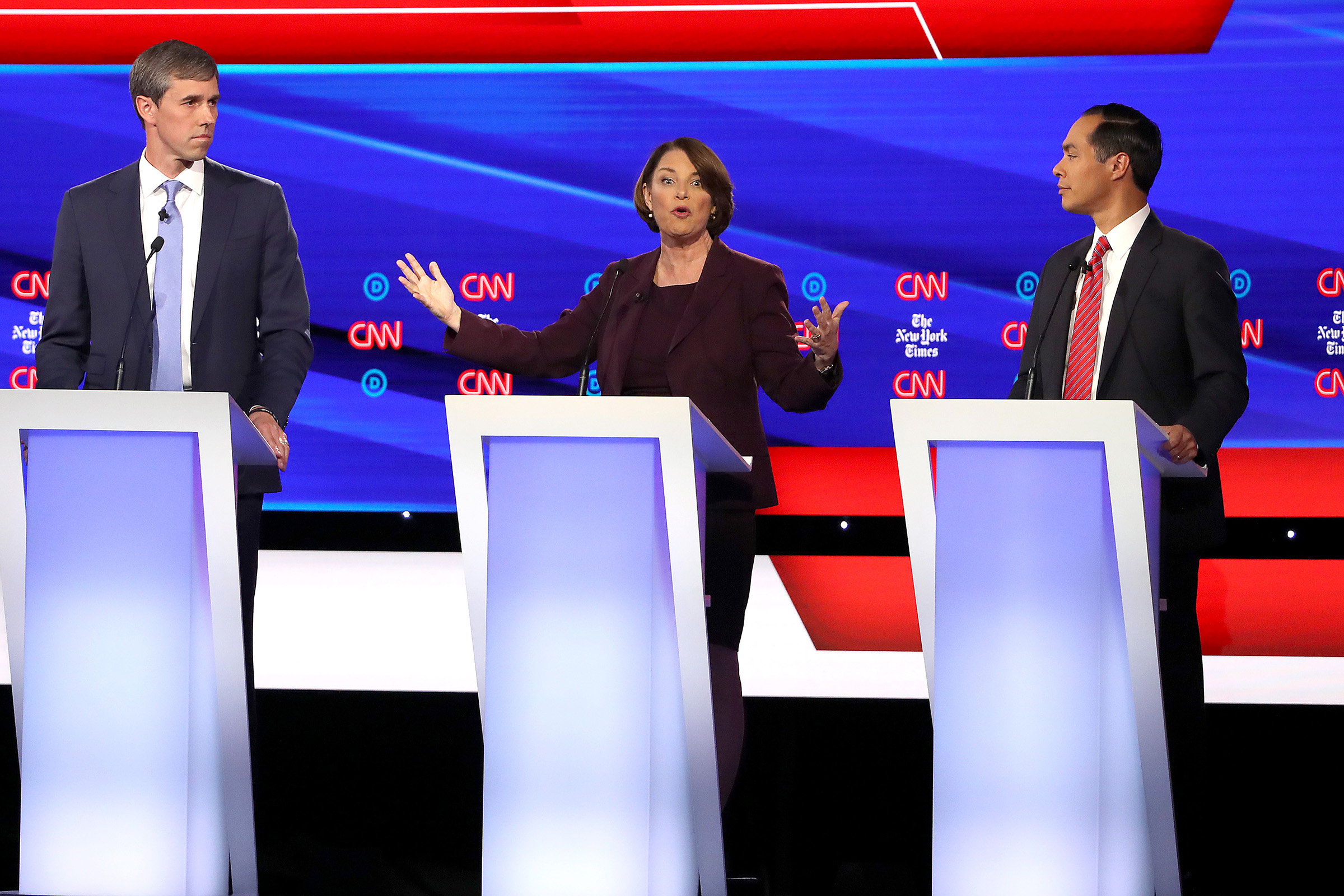
Asked if impeachment and removal from presidency was fair to Trump, Sen. Kamala Harris answered in the affirmative. “He has committed crimes in plain sight,” she said, adding, in reference to her previous career as a prosecutor, “I know a confession when I see it.”
Other candidates, including Sen. Amy Klobuchar, Sen. Cory Booker, Julian Castro and Pete Buttigieg, also agreed in their calls for impeachment. Andrew Yang became the first candidate to move from talking about impeachment to topics like automation and job loss — topics he said voters cared about more. “Why did Donald Trump win your state by eight points?” he asked about voters in Ohio, where the debate was held. “Because we got rid of 300,000 manufacturing jobs in your towns?”
He added, referring to Trump, “When we’re talking about him, we’re losing.”
Sanders says he’s “feeling great” when asked about recent health scare
After suffering a heart attack at the beginning of October, Bernie Sanders attempted to quell worry over his capacity for the presidency during the debate.
“I’m healthy. I’m feeling great,” he said when the debate moderator turned to the topic of his health.
Asked how he would reassure Democratic voters that he’s up to the stress of being president, Sanders issued an invitation to his upcoming campaign rally on Saturday in Queens, N.Y, touting a “special guest” who would make an appearance. Sanders then thanked his team and colleagues for their love and support in the aftermath of his heart attack.
Buttigieg calls out O’Rourke on “courage”
At the previous debate in September, O’Rourke made waves with his statement on assault rifles that “hell yes,” he would “take your AR-15, your AK-47.”
But at Tuesday’s debate, Buttigieg got possibly the most notable line of an exchange on guns.As for how he would actually enforce weapon buybacks, the former Texas congressman said, “If someone does not turn in an AR-15 or an AK-47…then that weapon will be taken from them. If they persist, there will be other consequences.”
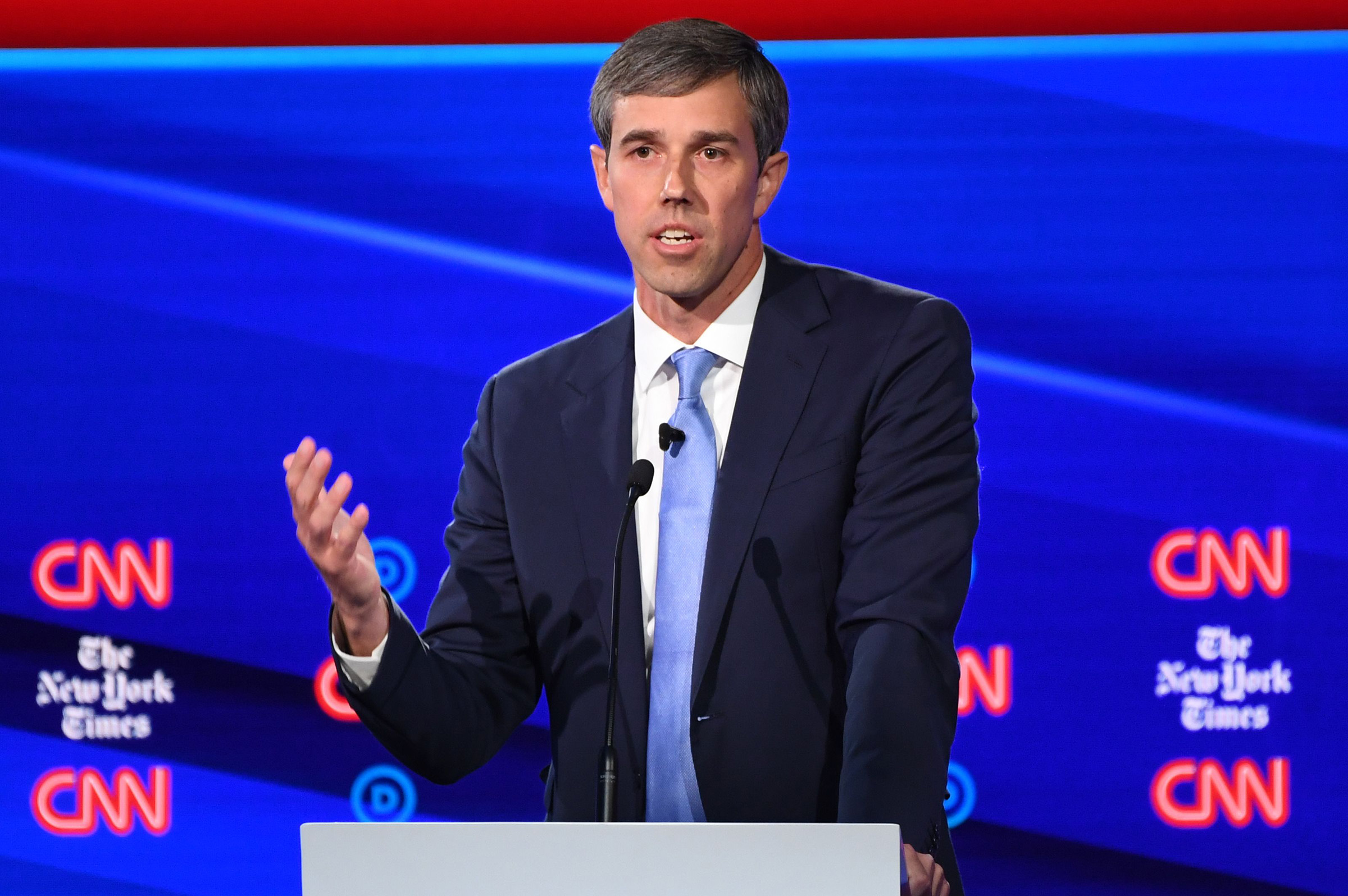
Buttigieg argued that O’Rourke hadn’t laid out a plan of action. “You just made it clear that you don’t know how this is actually going to take weapons off the streets.” In O’Rourke’s retort, he suggested that Buttigieg should “not be limited by the polls, and the consultants and the focus groups, let’s do what’s right while we have time to do what’s right.”
But Buttigieg, an openly gay veteran, came swinging with a sting. “I don’t need lessons from you on courage — political or personal.”
Pete Buttigieg and Tulsi Gabbard square off on Syria
Tulsi Gabbard and Pete Buttigieg, the only two veterans in the debate, sparred sharply over the U.S.’s policy in Syria. Earlier this month, the Trump Administration announced plans to withdraw troops from northeastern Syria, which critics have argued abandons U.S. Kurdish allies, who were key in the fight against ISIS.
Gabbard, an Iraq war veteran who has a strong anti-war stance, has called for U.S. withdrawal from the region, arguing that U.S. involvement in a “regime change” war in Syria has increased casualties and the refugee crisis. Cooper asked Gabbard how her withdrawal of troops would be different from President Trump’s. She responded that people need to understand that the “slaughter of the Kurds being done by Turkey is yet another negative consequence of the regime change war that we’ve been raging in Syria.” She argued that in addition to the President, many politicians on both sides of the aisle, as well as members of the mainstream media, have the “blood of the Kurds” on their hands because they have supported the war.
Gabbard has faced criticism for her approach toward Syria in the past. In 2017, she traveled to Syria to meet with dictator Bashar al-Assad, who has been condemned for using chemical weapons against his own citizens. Gabbard has since said that Assad is a “brutal dictator,” but still opposes U.S. involvement in the region.
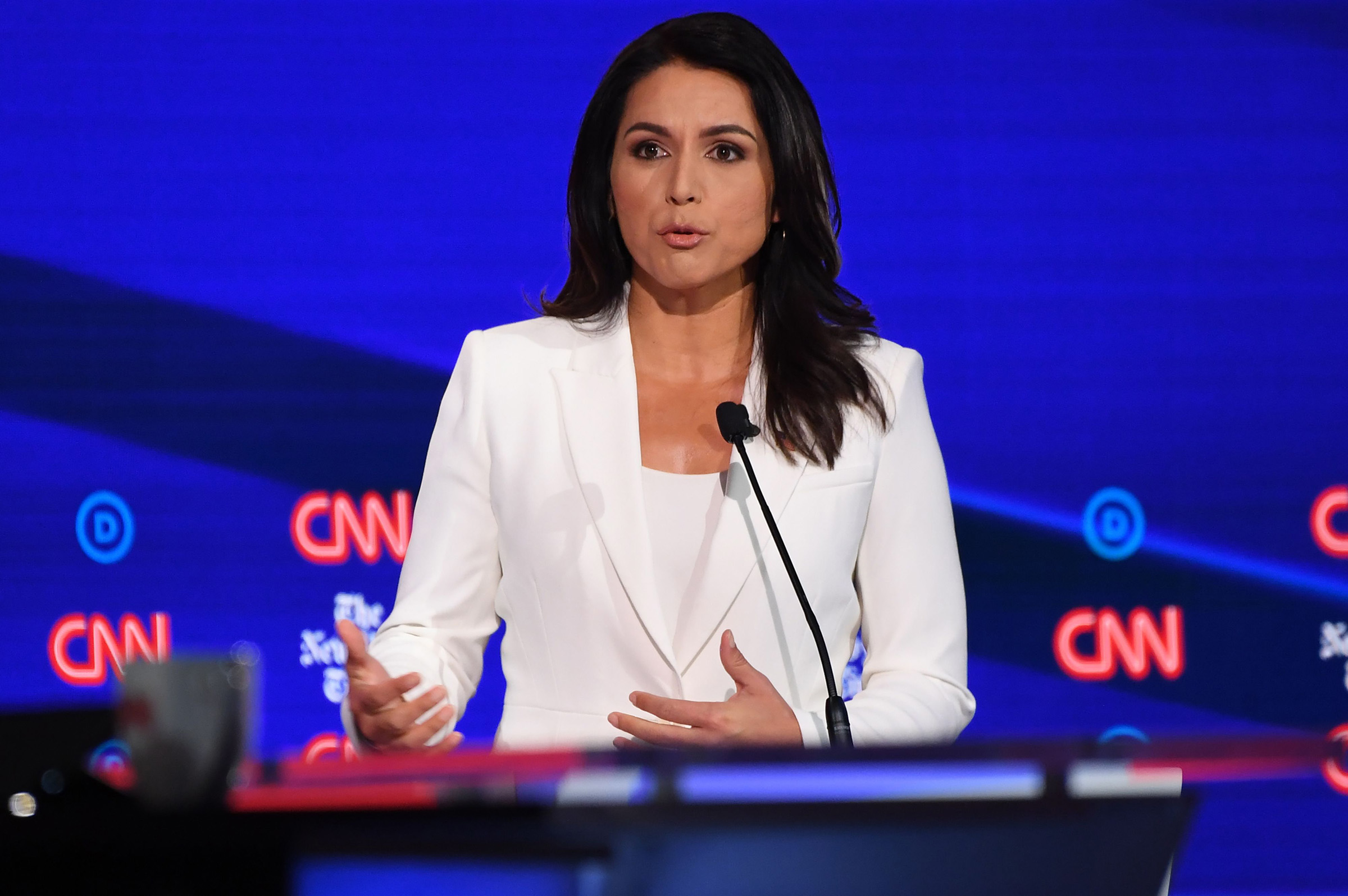
The Obama Administration backed rebel forces in the Syria civil war against al-Assad, and allied with a largely Syrian Kurdish militia in the fight against ISIS in the region. During Tuesday’s debate, Gabbard said she would end “regime change wars” with two tools: ending “draconian” sanctions, and making sure “we stop support terrorists like Al Qaeda in Syria.” Gabbard then asked Warren to join her to call for an end of U.S. involvement in Syria. Warren said she opposes U.S. involvement in the Middle East, but wants to withdraw in the “right way.”
Buttigieg, a former intelligence officer in the U.S. Navy who served in Afghanistan, then jumped in to strongly oppose Gabbard’s suggested strategy. “I think that is dead wrong,” he told her. “The slaughter going on in Syria is not a consequence of American presence, it is a consequence of a withdrawal and a betrayal by this President of American allies and American values,” he said. He continued that while he opposed the Iraq war and wants to withdraw troops from Afghanistan, “it’s also the case that a small number of specialized special operations forces and intelligence capabilities were the only thing that stood between that part of Syria and what we’re seeing now, which is the beginning of a genocide and the resurgence of ISIS.”
Gabbard responded that Buttigieg appeared to be saying that he wants to keep troops in the region for an indefinite period of time, stay in a war that “has undermined our national security,” and continue the U.S. policy of providing arms to terrorist groups on the ground against Assad. But Buttigieg shook his head as he disagreed with her characterization. “You can put an end to endless war without embracing Donald Trump’s policy as you’re doing,” he said.“ Will you end the regime change war is the question,” she responded.“What were doing in Syria was keeping our word,” he said. “Part of what makes it possible for the United States to get people to put their lives on the line to back us up is the idea that we will back them up too.”
A moment for reproductive rights
Both Cory Booker and Kamala Harris brought up reproductive rights early on in Tuesday’s debate, so they certainly were prepared when CNN’s Erin Burnett asked the candidates about those states which were engaged in restricting abortion rights.
On the choice to have a child, Harris said, “Our bodies were created to do that, and it does not give any other person the right to tell a woman what to do with that body. It is her body. It is her right. It is her decision.”
Booker, who earlier in the night said that “women should not be the only ones taking up this cause and this fight,” proposed a plan to make an “office of reproductive freedom and reproductive rights” in his White House if elected. Klobuchar used her response to call out Trump for defunding Planned Parenthood. “Donald Trump, you are not on the side of women,” she said.
Many candidates, including Biden and Booker, said that they would work towards codifying Roe v. Wade to prevent states from criminalizing abortions.Warren used her experience to comment on how class can impact access to abortion. “I lived in America where abortions were illegal,” she said. “And rich women still got abortions.”
Ellen DeGeneres questions sparks criticism
The final question of the debate prompted a wave of criticism online. In reference to a recent controversy involving Ellen DeGeneres defending her friendship with former President George W. Bush, candidates were asked about their friendships with people that would “surprise” voters. Some candidates named specific people—the late Sen. John McCain was invoked multiple times — while others talked about different moments in their lives in which they developed relationships with people who hold opposing beliefs.
Critics said the question in the CNN and New York Times debate was a waste of time, particularly during a debate where pressing issues like climate change and the U.S.’s relationship with China went without a mention.
More Must-Reads from TIME
- Cybersecurity Experts Are Sounding the Alarm on DOGE
- Meet the 2025 Women of the Year
- The Harsh Truth About Disability Inclusion
- Why Do More Young Adults Have Cancer?
- Colman Domingo Leads With Radical Love
- How to Get Better at Doing Things Alone
- Michelle Zauner Stares Down the Darkness
Write to Madeleine Carlisle at madeleine.carlisle@time.com, Mahita Gajanan at mahita.gajanan@time.com, Abigail Abrams at abigail.abrams@time.com, Abby Vesoulis at abby.vesoulis@time.com and Rachel E. Greenspan at rachel.greenspan@time.com
